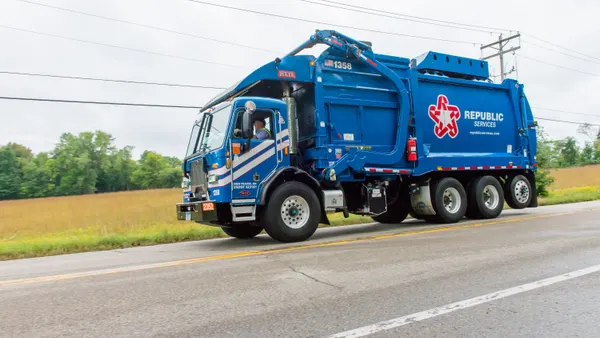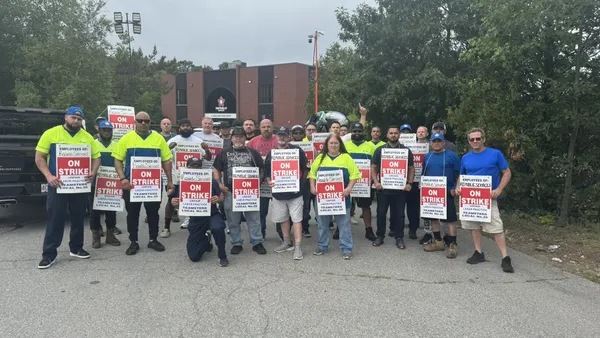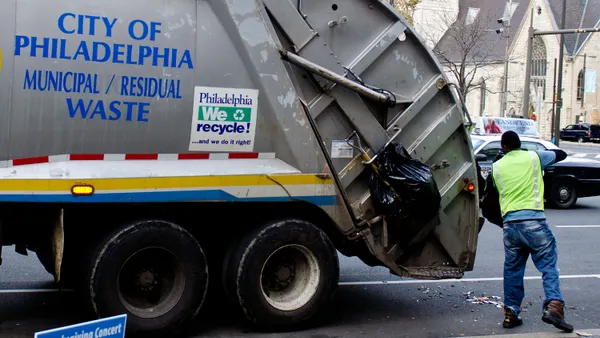UPDATE: June 21, 2019: The House of Representatives unanimously passed an amendment to H.R. 3055 — an appropriations bill for multiple departments and agencies — on Thursday, furthering calls for a national recycling strategy.
The amendment was intended to "accompany/emphasize the existing report language," according to Blake McCarren, press secretary for Rep. Haley Stevens, who co-sponsored the legislation with Rep. Kim Schrier. The amendment highlights representatives' interest in working with the EPA develop a recycling strategy that will "ensure long-term stability for local programs," according to the press release.
"After learning about the rising costs and challenges of maintaining local recycling programs in southeast Michigan, I have been working to bring attention to the recycling crisis that is unfolding in communities around the country," Stevens said in a statement.
Dive Brief:
- A report attached to the FY 2020 Interior-Environment Funding Bill includes language directing the U.S. EPA to "help ensure the long-term economic and environmental viability of local recycling programs by exercising national leadership and facilitating the harmonization of standards."
- The report calls for EPA to devise recommendations for voluntary actions that might "strengthen and sustain the current system" — including the implementation of standardized recycling labels across the country — "in collaboration with for-profit, non-profit, state and local governments, and other stakeholders."
- "The national recycling strategy is an absolute priority in order to strengthen recycling in communities across America," said Rep. Betty McCollum, chair of the Interior, Environment and Related Agencies Appropriations Subcommittee, in a statement. "It is environmental and economic madness to fill landfills and incinerators with recyclable materials because of confusion at the bin. Every household, business, school and institution should be using a standardized system to eliminate contamination and increase effective recycling."
Dive Insight:
While not directly named in the bill, the labeling system in question is backed by nonprofit Recycle Across America (RAA). The organization's approach is touted as a means of reducing recycling confusion and contamination — an increasingly pressing concern, given China's decision last year to enact a rigorous 0.5% contamination standard on scrap imports.
According to the organization's website, RAA's labels — which have been adopted by major brands, K-12 schools and Rhode Island — have been shown to help increase recycling levels by 50-100% while "significantly" decreasing the amount of garbage thrown in recycling bins.
"It's time to make recycling thrive economically, in all markets, in all geographic areas — and the only way to achieve that is to eliminate the public confusion and skepticism at the recycling bin[,] which is the genesis of the costly contamination," RAA Executive Director Mitch Hedlund told Waste Dive via email. "Recycling doesn't work well, markets can't be strong, and manufacturers can't rely on recycled commodities unless they can rely on the quality, the quantity and the pricing at scale — which require[s] the public to be able to recycle properly wherever they are."
Hedlund conveyed optimism over the initiative's chances in Congress, characterizing recycling as a "bipartisan public action" that — when executed properly — "has tremendous economic, manufacturing and shareholder benefits in the U.S."
"I have many reasons to believe that achieving federal legislation for the society-wide standardized labels on bins will pass as a bipartisan initiative," she wrote.
In addition to analyzing the benefits of standardized labels nationwide, the bill report also asks EPA to investigate the impacts of public recycling education as well as "other opportunities to significantly reduce cross-contamination and com[m]ingling of materials entering the recycling stream, as part of efforts to increase the economic viability of processing recyclable materials." These materials, per the report, include paper, cardboard, plastics, metals, electronic waste, and compostable materials.
The bill, which was approved by the House Appropriations Committee on May 22, awaits consideration on the House floor. In the meantime, advisory meetings spurred by last year's EPA Recycling Summit are ongoing — with one action item aimed specifically at education and outreach.









